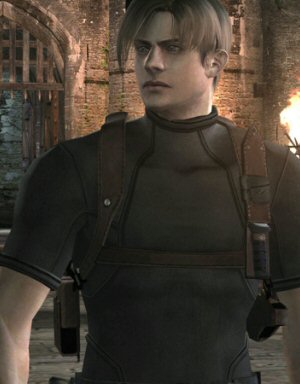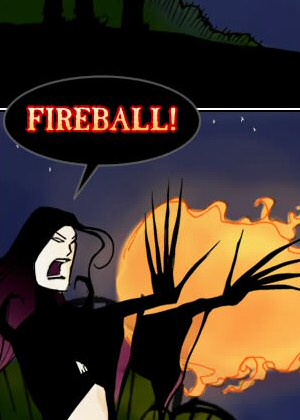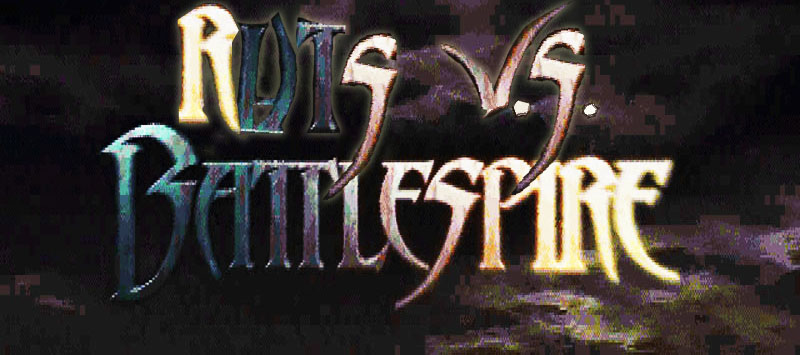So I spawn here, weak and tired
Another gulf of lava beckons
Once again, yours truly reckons
Soon I’ll be in daedra mired
And again, be Battlespire’d

Shake the handle off death’s rattle
Then, once more, my zig-zag hustle
One more time, a stupid puzzle
Listen to an end-boss prattle
Shuffle to the final battle
One last gizmo to collect:
Guess what? It’s…a magic sword?
You can’t blame me for being bored
It’s just that I’ve come to expect
To be perplexed, or made erect
Once I’ve prised from boobed vault
McGuffin’s Razor (quest prescribed)
And mook-frustrating drinks imbibed
I zip past goons and do not halt
It’s cheap, it works–that’s not my fault
Without a death, with little luck
I find this…giant crossbow thing?
With coiled giant crossbow string?
A parting stroke from merry Puck,
This final dose of what-the-fuck

Its purpose to the unbent mind
I guess would not be evident
And yet I know just what is meant:
A magic pixel I’m to find,
To touch, and leave the this ledge behind

My toes aloft on thirsty ground:
Before the way ahead is clear,
I’ve obstacles to disappear
The keys are spread across ten clowns
Their one desire, my balls to pound
A frothing, freakish company
To fill my fulsome heart with fear
You want a look? They should appear
Unless the game has broke on me–
Look below. What do you see?

It’s fortunate I’m fighting fit
I find, for as I’ve fiercely fought
Immunities I’ve dearly bought
Avail me not a single bit
Against some new spammed caustic shit
A dozen times I charge forth, brave
A dozen times I don’t reflect
A new malicious stat effect
That drags me down into my grave
I groan and grimace, load my save
I drink my potion cabinet dry
I trade in all my footwork tricks
I strain my wrist with hearty flicks
I make myself fleet, lean, and sly
Again, again, I charge and die
Until, at last, I make a check
That drives my sword through critically
And cleaves a minion to one knee
I reach into his bloody neck:
He’s got the key! Let’s run like heck!
And here we are, the last attack!
Our villain waits with hungry eyes
Behind his back, he flaunts his prize:
Trenelle suspended from a tack
(A final chance to flash some rack)

My final banter smacks of farce:
Surprise! I know your armor’s gaps…?
Surprise again! I’ve laid a trap…?
There’s one plot point I fully parse:
I’ve writ a check for kicking arse

The convo ends, my fingers race
And Dagon curls his meaty fist

Boobs twice! Suddenly she exists?
I grasp Swordguffin! Strike his face!
The engine whirs–
Clicks–
Sticks in place–




Resident Evil 4

Who is this imbecile and why is he wandering around Europe unsupervised?
If Star Wars Was Made in 2006?

Imagine if the original Star Wars hadn't appeared in the 1970's, but instead was pitched to studios in 2006. How would that turn out?
The Best of 2018

I called 2018 "The Year of Good News". Here is a list of the games I thought were interesting or worth talking about that year.
PC Gaming Golden Age

It's not a legend. It was real. There was a time before DLC. Before DRM. Before crappy ports. It was glorious.
Chainmail Bikini

A horrible, railroading, stupid, contrived, and painfully ill-conceived roleplaying campaign. All in good fun.
 T w e n t y S i d e d
T w e n t y S i d e d

[appreciative snapping intensifies]
Woohooo, congratulations!
You may now proceed to restart your mind in sane mode.
No really, you earned it!
Did I miss something or do you beat Dagon with a single stab, Legend of Zelda Wand of Gamelon style? I look forward to seeing what the game defines as a satisfying conclusion.
The final blow that sealed his fate
Was also first, to my surprise
My playmate popped before my eyes
As climax goes, it’s second rate
But easier to animate
How I wish this blog had a like function for comments.
\o/
Given what you know now, would you change your character creation any? Your play style did seem to fit that character perfectly (as well as it having shown an almost prescient understanding of some of the problems you’d be facing), but is there anything you’d do differently to make things easier?
For example, your Dodging skill didn’t seem to be quite as useful as I had originally thought, considering that many enemies simply annihilated themselves with area spells and geometry. Maybe increasing your Jumping skill would have been better? That sort of thing.
What WOULD have helped? the player rants
What skill would save my fragile neck?
What benisons escape this wreck?
I wouldn’t budge, given a chance:
This game is fucking crazypants.
Goddammit, where did I put my Rutskarn repair manual.
Especially enjoying the text-pasties this time around.
I never knew the Daedra Lord of Destruction was so modest.
Pasties the Dark Lord
Didst foully wear
Little text boxes
To cover his bare
But a thin-threaded loin cloth
Was all he could bear
We Drink to our youth
And to days come and Gong
But the Age of Oppression
Is just about-
Uh-oh, it’s contagious!
Dong.
Just about dong.
I figured it was ‘four levels too long’.
I have no idea what just happened.
He won, but at the cost of his ability to write normal prose.
Did he just beat Battlespire…
Battlespire broke Rutskarn.
I can’t wait to see what batshit insane game he finds to trump this one.
Great bit of poetry there, Rutskarn. I can definitely smell an English major behind it, because you’ve managed to achieve a consistent meter (it’s so easy and yet so few writers can do it). Is there a technical term for the structure you’ve used or is it improvised?
Iambic pentameter? (hat’s the only style I could name even if i can’t tell you what it is- science major here!)
Coming soon, on Broadway: The Elder Scrolls : Battlespire : The Musical: by Gilbert and Sulivan, and Rustkarn!
Rutskarn is actually using trochaic quadrameter. It’s time for a METER LESSON.
Meter is actually really simple — it’s basically all maths. Formal metered poetry uses either blocks of two or three syllables called “feet”, with the emphasis on one syllable. The first word in a phrase like “iambic pentameter” refers to which syllable in the foot is stressed, while the second word is the number of feet per line.
The first word will be one of these:
– “Trochaic” means that the stress is on the first of two syllables (“Double, double, toil and trouble”)
– “Iambic” means that the stress is on the second of two syllables (“Shall I compare thee to a summer’s day“)
– “Dactylic” means that the stress is on the first of three syllables (“Just for a handful of silver he left us, just for a riband to stick in his coat“)
– “Amphibrachic” means that the stress is on the second of three syllables (“There once was a girl from Nantucket”)
– “Anapestic” means that the stress is on the third of three syllables (“Twas the night before Christmas, and all through the house“)
It’s worth pointing out that I’ve deliberately chosen the most unambiguous examples I could find for these meters. They can be much more ambiguous, particularly when you’re dealing with blocks of three. Depending on where you put the feet, The Cat in the Hat could be read as dactylic, amphibrachic, or anapestic — Wikipedia leans towards anapestic but the lines are so short it’s hard to place the feet precisely.
The second word describes the number of feet that each line contains, using Greek numbers:
3: Triameter
4: Quadrameter
5: Pentameter
6: Hexameter
7: Heptameter
(If you need help memorising these, it’s the same set of prefixes that we use for polygons of different numbers of sides — triangle, quadrilateral, pentagon etc.).
So my first set of examples are:
– Trochaic quadrameter
– Iambic pentameter
– Dactylic quadrameter
– Amphibrachic triameter
– Anapestic quadrameter
And Rutskarn’s poetry is trochaic quadrameter:
So I spawn here, weak and tired
Another gulf of lava beckons
Once again, yours truly reckons
Soon I'll be in daedra mired
And again, be Battlespire'd
Although, in the spirit of ambiguity, some of the meter can be read as more iambic. The quadrameter is rock-solid though.
No, no, no. “Lambic” means a type of Belgian beer — kinda dry, fruity or cidery, like gueuze or kriek, quite for a connoisseur; (“Rutskarn definitely deserves to pour himself a pint of lambic to commemorate the end of his ordeal”)
…oh, you were writing about iambic? Oh. Carry on then!
Well, I learned something today. Thank you for that.
Ruts’ verse seems to shift between trochaic and iambic on a case-by-case basis, it doesn’t seem to be intended as fully either-or. I don’t suppose there’s a fancy term for that, also?
I would call that “default”.
All joking aside there may be, but not to my knowledge. The majority of poetry, and speech for that matter, naturally shifts between accentuating syllables on a word-to-word or sentence-to-sentence basis unconsciously. Iambs and trochees and dactyls (oh my) have specific words for them because they mean intentionally picking your words so that the accentuation comes in a distinct pattern, which breaks with natural speech patterns in most cases.
I learned it as “tetrameter” and not “quatrameter”, but otherwise that’s my take on it as well. “The Raven” is, perhaps, one of the most famous examples of trochaic tetrameter and Rutskarn seems to have borrowed at least one phrasing from it (“weak and tired” versus “weak and weary” in Poe’s poem). Some of the lines are definitively Iambic here, though, like:
Surprise! I know your armor's gaps…?
Surprise again! I've laid a trap…?
So it’s a switching scheme, but it seems to be at least on a per-line basis.
The rhyming scheme, meanwhile, is a consistent A-B-B-A-A, an inverse limerick. I don’t know if that has any fancy word associated with it.
Rutskarn’s switching may be intentional there. In English, iambic meters are closer to how people naturally speak, while trochaic meters have a singsongy, “look at me I’m doing a poem” feel (The Raven is a good example of this, as is the Song of Hiawatha). So switching to iambs at this moment could signal that these lines are dialogue instead of narration, since they sound more like speech. The iambs also make the lines feel more active in contrast to the dreamy trochees, and the change grabs the reader’s attention, so the whole verse works like a dramatic reveal of the end boss.
No offense, but I always hated the ambiguity in meter, when it’s made out as though it’s so “structured.”. It always strikes me as a circular qualification–we’re reading poetry so we finagle pronunciation to say there’s a meter.
Take your iambic example–the only reason I we for stressing “I” instead of “Shall” or “to” instead of “thee” is… because it’s iambic and that’s what you do.
To me, it seems like the author should just say “read it this”way in the margins instead of making it out like meter is hard and fast.
Indeed, spoken meter isn’t hard and fast in the way that it is often taught, and there is a certain amount of discretion that is left to the reader when stressing and unstressing syllables.
You can, of course, diagram out ever alternating stressed and unstressed syllables in a way that fits perfectly into iambic [X]ameter (in the way that most high school English teachers, alas, require). Take, for example, Grudgeal’s post above diagraming Rutskarn’s lines as:
Surprise! I know your armor's gaps…?
Surprise again! I've laid a trap…?
But I would also argue that the musicality of the following couplet would be enhanced by speaking it as:
There's one plot point I fully parse:
I've writ a check for kick ing arse
Strictly speaking, this isn’t what most verse teachers want to see you do, and some (quite strongly) insist that both couplets should be diagramed as Grudgeal diagramed his, using only the unstressed-stressed structure. To them, I can only quote Emerson, and say that a foolish consistency is the hobgoblin of little minds.
It’s useful to understand the strictly formal structure. But that doesn’t mean that deviations from that structure are not also sometimes appropriate.
“Meter is actually really simple — it’s basically all maths.”
You lost me already.
That third-to-last image kinda looks like Earthworm Jim carrying a skeleton. Is it just me? Not sure what the “7” is….
Um…so did he beat the game? I couldn’t read this one because poetry makes my brain ache. Like, even good poetry. I hate it so much.
Yup. Breakdown for you and any similarly vexed:
-Arrived at the final level
-Found a magic sword that can kill Dagon
-Fought past a bunch of glitching awful enemies who can get through my resistance
-I turn out to have a bunch of plot-related advantages that will let me take down Dagon, which is convenient if not entirely comprehensible given my feeble grasp of the main narrative
-I hit him once and win the game
Thank you! And congrats!
Why?
As someone with similar issues — who therefore didn’t enjoy this last post at all — here’s how it seems to work for me:
It’s harder to tell a good narrative with poetry because you have to fit into the stylistic meter of the style of poetry you’re using, which means that there are lots of time where either the descriptions are less clear or more “wordy” because of it. This especially applies to more “flowery” poetry like this post. So, reading it to get the narrative when its focus is on the poetic part is frustrating. If you don’t happen to enjoy the stylistic aspects, then there’s little to make you want to read it, as the narrative won’t come through as clearly and the style doesn’t grab you.
I tried reading Dante’s Inferno once, and that was the issue I had with it: I was interested in the story, but it was too much of a struggle for me to extract it from the poetry. And any stylistic elements I like in poems also tend to show up in songs, which I like a lot more.
In summary, if you don’t care for the stylistic elements found in poetry, reading it will never be fun for you.
Indeed. While I enjoyed this episode for its novelty and skill in execution, I wish it hadn’t been used for the final episode. I was really hoping for more clear prose to wrap the series up in the end and either explain how the game ties everything together, or demonstrate how it doesn’t.
That’s for next post, don’t worry.
If you still feel like reading Dante’s work, get a different translation. There’s all kinds, those that try to fit poetry in the translation, those that aim to explain almost everything (often with enough notes to double the size of the book) and those that try to make it as easy to read as possible.
Got a couple on my shelf. During highschool I read two versions simultaneously (read a part in the ‘easy’ version, then the once with notes). Only after that did I read a version that stuck to poetry.
For what it’s worth, I enjoyed this ending. I do hope that there’s a final post after this with explanations, impressions and what have you.
I am also not really a big fan of verse for epic story telling. However, in this case I do think that mad verse to end a mad game is very appropriate.
My eyes gaze upon the first picture,
do they deceive me or not?
For surely that which I see,
there in the distance to the right.
It is a toilet, a large one at that.
And now I can not unsee that.
Uh, hat . . . hat?
See? Ordinary people are terrible at meter. Corrected for the sake of Shakespeare pedants everywhere:
On picture one my eyes do skitter,
I fear they may have been deceived,
It can be seen, but not believed;
Off to the right, above the litter,
Far in the back; a giant toilet?
I have no idea why you are talking about a measurement in the metric system.
Also those where my own words, I did not rip off Shakespeare (I have never read any of Shakespear’s works, I do not belive I’ve seen any of “his” movies either.).
Also, do not be quick to call me ordinary. If I where ordinary I probably would not be lurking around this site. Remember the law over averages, if a person is “average” then 50% of the population is dumber than them relatively speaking (wait’s for a statistician to blow a gasket).
What I wrote I believe it’s called a free verse (had to look it up).
Edit (link): https://en.wikipedia.org/wiki/Vers_libre
But Rutskarn wasn’t writing in free verse. Rutskarn was writing in trochaic quadrameter.
I’m not Rutskarn.
Not only is it contagious, now the strain is mutating!
Median, not average.
50% of people are below the median.
I thought that was mean? (I always mix up mean and median, forgetting which one of them is the same as average).
mean = average = “sum of values / number of values”
median = “the middlemost value”
E.g. If you have values of 1, 2, 3, 4, 15: the average (AKA mean) is 25/5 = 5. But, you’ll note that 50% of the population isn’t below average, 80% of the population is. On the other hand, the median is 3, and it splits the population in half. (As close as you can come with an odd number of values)
So, yes. “50% of people are below the median” is a more accurate statement than “50% of people are below average”, if you’re into statistical pedantry.
(If you’re not into statistical pedantry: you can point out that “average” is generally being used in an informal sense, not a technical sense, and that in most cases “50% of the population is below average” since these sort of things tend to fall into bell curves, anyway).
Ok! So mean has a specific method, and median do too but one must make sure to include the amount of outliers one will ignore? (commonly the top 10% and bottom 10%? Or is it 10% total (so 5% lowest and 5% highest)?
I’ll try to refrain from using average in the future as I tend to mean median (usually) in those cases. Or maybe just “Average (median)” or “Average (Mean)” ?
Colloquially, the “average” is the mean. “50% of the population” statements seem to be the only common exception.
Pedantry: they’re technically both an “average”, because the word doesn’t refer to a single measure.
Yeah, I was never taught that “average” should exclusively mean “mean”. I mean, that’s the meaning you learn when you’re, like, 9 or whatever, but once you start learning about other kinds of averages, I always got the impression that insisting that “average” must mean “mean” is pretty much on the same level as insisting that any of the other myriad incorrect things you were taught at that age must in fact be true.
Its not mean to correct someones mistake in such a polite fashion.
That’s just heroic work there on the last line for anyone paying attention.
I think that is the stupid giant crossbow.
If it was a pedestal I’d let it slide, but that weird back wall combined with the lip around the pedestal? I don’t think it’s coincidence it looks like that!
Well, he is walking on a pipe.
These
maurination metaphors are getting obscure.https://www.youtube.com/watch?v=JSUIQgEVDM4&t=58s
I think you messed up the the url. it should probably have been ?t=690 instead. :P
Great finale! I wouldn’t have it any other way.
Is that the end? I liked the rhyming and how you’ve kept it up in your replies to comments. That was a fun series. All told, how many hours did you sink into the game?
Sad to say, but DOS
Keeps no record of my time
Now I estimate (in rhyme)
Just how long was my distress:
Fifty hours, more or less
Wait, people pronounce it Dee-Oh-Ess? All this time I’ve been saying “doss.”
This would be artistic license.
I’m also pretty sure the OS is called ‘doss’, while DeeOhEss is ‘denial of service attack’.
Though I think one could say this game conducted a DeeOhEss against Rutskarn’s mind.
But as said, artistic licence and do you know how hard it can be to find a fitting rhyme? :p
Everyone calls it “doss” but it’s actually Microsoft Disk Operating System. (Because it runs from a disk drive instead of being hardwired into the mainboard).
In future years this series will be read as one man’s descent into madness, Lovecraft-style.
Too long has Rutskarn gazed upon Battlespire, now only Battlespire remains.
Had to fight the urge to skip the verse, the way I do when I’m reading Tolkien.
Pearls and swine: your artful meter,
Is wasted on this shitty game.
For your sanity I feà r,
…but I’m glad you played it, all the same.
A challenge for the strong of will!
Or journalism come too late
to help, or maybe tempting fate.
A task of patience, luck, and skill?
I’m glad you’ve finally had your fill.
No doubt your eye with wonder flows
now that you gaze upon the view
(or DOS prompt) that you had in lieu
of miring mind in grungy prose
while drinking potion from a hose.
But no more task? No trials gaunt?
No late-night searching wiki bare
while scowling? Pulling out your hair?
No daedra dribbling flacid taunt?
No glitchy walls? No boobie flaunt?
How will you live, a creature now
accustomed to such rare abuse?
You beat the game, but what’s the use?
Innured to battlespire I’ll trow,
you’ll live a normal life… But how?
Or as I’d phrase it:
Bethesda once made a game
To drive the players insane.
Even if they survive,
and reach outro alive,
they speak only in verses inane.
And now it’s reaching epidemic status!
The text covering Dagon’s nipples got me to laugh out loud (literally).
I was led briefly to wonder if there were naked women behind Dagon that were still being censored.
This series
I read, and laughing
Say “Encore”.
1)
More poetry should involve confused statements ending in ellipses and question marks. The whole poem was amazing, but I especially loved this bit.
2)
I personally didn’t have trouble reading it, but perhaps marking it as “boobéd” would make the pronunciation more clear overall?
3) Sort of a repetition of #1, but well done! That was a great read. It’s wonderful to find a poem with a consistent meter you can lose yourself in without worrying about suddenly being yanked out of it by an inconsistent line.
So that’s it, huh? Lot of series ending around here lately. And Battlespire sure ended as it began: A weird anticlimactic mess. Thanks for all the posts, Ruts, this has been a fun series to read.
1: brilliant finale. Given its effect on your English language abilities, could Batflespire have been turned into a brilliant bit of ludic finaglement by find-and-replacing every mention of Mehrunes Dagon with Sheoggorath?
2: I read this, tabbed back to the front page, reread the title, and came back specifically to groan at the title pun. I assume this was intentional, so well done. Also, I hate you.
Next Week: Redguard!
There’s nothing more epic to finishing a quest line than killing the final boss with one blow.
Edit: I keep forgetting to put my forum username…
It’s there going to be a wrap up, what I learned from playing Battlespire type post? I genuinely wonder what CAN be learned from such a mess.
I believe so. Well, either that or a postcard from the asylum, style o’ fing. But he did say on Twitter:
Yay! These posts, combined with the FFX/ME long form stuff and a good season of Spoiler Warning, makes it feel like we’re in a bit of a golden age of Twentysided.